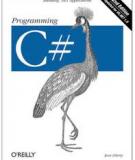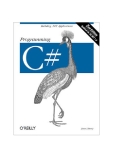Tài liệu Thư viện số
- Công nghệ thông tin (2019 )
- Điện tử viễn thông (1133 )
- Quản trị kinh doanh (1305 )
- Kế toán (1004 )
- Môi trường (968 )
- Du lịch (861 )
- Kiến trúc (424 )
- Xây dựng (1082 )
- Ngoại ngữ (302 )
- Y dược (1391 )
- Khoa học tự nhiên (874 )
- Khoa học xã hội (514 )
- Lý luận chính trị (575 )
- Sau đại học (243 )
- Tài liệu tham khảo khác (252 )
Danh mục TaiLieu.VN
- Mẫu Slide Powerpoint
- Luận Văn - Báo Cáo (344720)
- Kinh Doanh Marketing (65512)
- Kinh Tế - Quản Lý (48934)
- Tài Chính - Ngân Hàng (55898)
- Công Nghệ Thông Tin (142209)
- Tiếng Anh - Ngoại Ngữ (47066)
- Kỹ Thuật - Công Nghệ (134345)
- Khoa Học Tự Nhiên (107174)
- Khoa Học Xã Hội (82451)
- Văn Hoá - Nghệ Thuật (54408)
- Y Tế - Sức Khoẻ (173915)
- Nông - Lâm - Ngư (62504)
- Kỹ Năng Mềm (29016)
- Biểu Mẫu - Văn Bản (27610)
- Giải Trí - Thư Giãn (51994)
- Văn Bản Luật (198854)
- Tài Liệu Phổ Thông (402015)
- Trắc Nghiệm Online (213578)
- Trắc Nghiệm MBTI
- Trắc Nghiệm Holland
Programming C#
Every 10 years or so a new approach to programming hits like a tsunami. In the early 1980s, the new technologies were Unix, which could be run on a desktop, and a powerful new language called C, developed by AT&T. The early 90s brought Windows and C++. Each of these developments represented a sea change in the way you approached programming. Now,.NET and C# are the next wave, and this book is intended to help you ride it. Microsoft has 'bet the company' on .NET. When a company of their size and influence spends billions of dollars and reorganizes its entire corporate structure to support a new platform, it is reasonable for programmers to take notice. It turns out that .NET represents a major change in the way you'll think about programming. It is, in short, a new development platform designed to facilitate object-oriented Internet development. The programming language of choice for this object-oriented Internet-centric platform is C#, which builds on the lessons learned from C (high performance), C++ (object-oriented structure), Java (garbage collected, high security), and Visual Basic (rapid development) to create a new language ideally suited for developing component-based n-tier distributed web applications.
Từ khóa: điều khiển csharp, Programming C#, kỹ thuật máy tính, phần mềm ứng dụng, phần mềm csharp , giao diện csharp
586 p thi 02/10/2012 188 2





